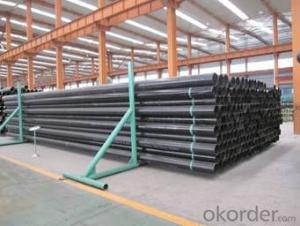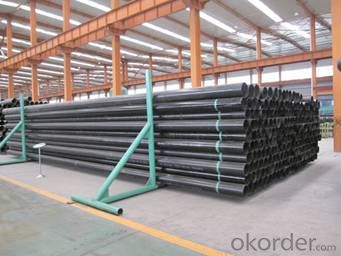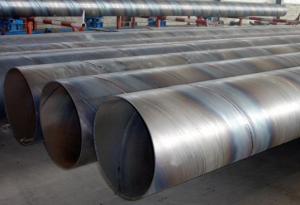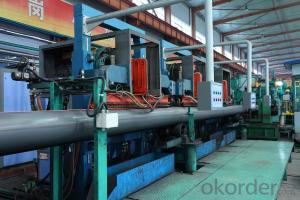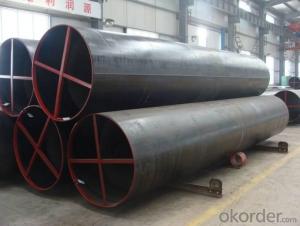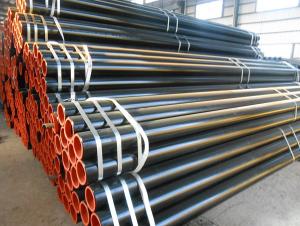ERW steel pipe
- Loading Port:
- China Main Port
- Payment Terms:
- TT OR LC
- Min Order Qty:
- -
- Supply Capability:
- -
OKorder Service Pledge
Quality Product, Order Online Tracking, Timely Delivery
OKorder Financial Service
Credit Rating, Credit Services, Credit Purchasing
You Might Also Like
ERW steel pipe /round tube
1. standard :API 5L GB/T9711.1 GB/T9711.2
2. material : Q195
3. MOQ :10 MT
4. technique : cold rolled
product name : ERW steel pipe /round tube
| Description | outer diameterr:14mm-80mm thickness:0.4mm-2.0mm length:5800 material:Q195 pipe surface: oiled smooth |
| Main usage | oil and water or other liquid transportation, construction,piling and other project |
| Origin | Tianjin,China |
| Produce technique | ERW steel pipe |
| Text certificate | SGS, BV, ISO9001 |
| Delivery time | 20days after receipt of the deposit |
| Main market | middle east, south America ,southest Asia and other parts of the world |
- Q: What does GALV mean in a steel tube?
- GALV is the abbreviation of English galvanized (Galvanized), which means galvanized steel pipe.
- Q: Are steel pipes suitable for underground mining operations?
- Yes, steel pipes are suitable for underground mining operations. Steel pipes are known for their durability, strength, and resistance to corrosion, making them ideal for use in harsh underground mining environments. They can withstand high pressure and are capable of transporting various substances, such as water, air, or mining materials, with reliability and efficiency. Additionally, steel pipes can be customized to meet specific mining requirements, ensuring their suitability for underground operations.
- Q: How are steel pipes protected against external corrosion in coastal areas?
- Steel pipes are protected against external corrosion in coastal areas through a combination of coating and cathodic protection measures. One of the most common methods used is the application of a protective coating on the surface of the steel pipe. This coating acts as a barrier between the steel surface and the corrosive elements present in the coastal environment, such as saltwater and humidity. The coating is typically made of materials like epoxy or polyethylene, which are resistant to corrosion and provide a long-lasting protective layer. In addition to coating, cathodic protection is also employed to further safeguard the steel pipes from corrosion. Cathodic protection involves the use of sacrificial anodes or impressed current to prevent the corrosion of the steel. Sacrificial anodes are made of more reactive metals, such as zinc or aluminum, which are attached to the steel pipe. These anodes corrode instead of the steel, sacrificing themselves to protect the steel surface. Impressed current systems, on the other hand, use an external power source to provide a protective current to the steel, preventing corrosion. Regular inspection and maintenance of the protective coating and cathodic protection system are crucial to ensure their effectiveness. Coatings may deteriorate over time due to wear and tear, requiring periodic inspection and reapplication if necessary. Similarly, sacrificial anodes need to be replaced when they are depleted, and impressed current systems require monitoring and adjustment to maintain the desired level of protection. Overall, by combining effective coating techniques with cathodic protection measures, steel pipes in coastal areas can be adequately protected against external corrosion, ensuring their longevity and optimal performance.
- Q: How do you clean and maintain steel pipes?
- To clean and maintain steel pipes, start by removing any dirt, debris, or rust using a wire brush or sandpaper. Then, wash the pipes with a mild detergent and warm water solution, using a cloth or sponge to scrub away any remaining grime. Rinse thoroughly with clean water and dry the pipes completely to prevent moisture-related issues. To maintain steel pipes, regularly inspect them for signs of corrosion or damage, and apply a protective coating or paint if necessary. Additionally, ensure proper drainage, avoid exposure to harsh chemicals, and promptly address any leaks or repairs needed to extend the lifespan of the pipes.
- Q: Can steel pipes be used for underground cable protection?
- Yes, steel pipes can be used for underground cable protection. Steel pipes offer durability, strength, and resistance to corrosion, making them suitable for protecting cables from external elements and potential damage. Additionally, steel pipes can provide a secure and reliable conduit for underground cables, ensuring their safety and longevity.
- Q: How are steel pipes used in the construction of dams?
- Steel pipes are commonly used in the construction of dams for various purposes. They are primarily used for the transportation of water within the dam structure, supplying water to turbines for hydroelectric power generation. Steel pipes are also used for drainage systems, allowing water to be discharged safely and efficiently. In addition, they are utilized for the construction of penstocks, which are large pipes that control the flow of water from the reservoir to the turbines. Overall, steel pipes play a crucial role in the infrastructure of dams, ensuring the efficient management and utilization of water resources.
- Q: Are steel pipes suitable for underground cable protection?
- Yes, steel pipes are suitable for underground cable protection. Steel pipes provide excellent mechanical strength and durability, protecting cables from external forces such as ground movement or accidental damage. They also offer resistance to corrosion, making them a reliable choice for long-term cable protection in underground installations.
- Q: What is the role of steel pipes in the renewable energy sector?
- Steel pipes play a crucial role in the renewable energy sector by facilitating the transportation and distribution of various energy sources. One significant application of steel pipes is in the construction of pipelines for transporting natural gas, which is increasingly being used as a cleaner alternative to traditional fossil fuels. These pipelines are often made of steel due to its strength, durability, and resistance to corrosion, ensuring the safe and efficient delivery of natural gas to power plants and other energy consumers. Moreover, steel pipes are utilized in the installation of geothermal energy systems. Geothermal energy harnesses the heat from the earth's core to generate electricity or provide heating and cooling. Steel pipes are used to create geothermal wells, allowing for the extraction of hot water or steam from underground reservoirs. These pipes must withstand high temperatures and pressures, making steel an ideal material for this application. Additionally, steel pipes are employed in the construction of hydraulic systems for hydroelectric power plants. These plants rely on the force of flowing water to generate electricity, and steel pipes are used to convey water from the reservoir to the turbines. The durability and reliability of steel ensure the efficient transmission of water, enabling hydroelectric power plants to produce clean and renewable energy. In the renewable energy sector, steel pipes also play a role in the construction of solar power plants. Solar thermal systems use mirrors or lenses to concentrate sunlight and generate heat, which is then transferred to a fluid to produce steam and drive turbines. Steel pipes are essential for circulating and transferring this fluid, ensuring the effective operation of the solar power plant. In summary, steel pipes are indispensable in the renewable energy sector for their strength, durability, and resistance to corrosion. They enable the transportation of natural gas, the extraction of geothermal energy, the transmission of water in hydroelectric power plants, and the circulation of fluids in solar power plants. By facilitating the efficient distribution of various energy sources, steel pipes significantly contribute to the growth and sustainability of the renewable energy sector.
- Q: What are the common defects found in steel pipes?
- Some common defects found in steel pipes include corrosion, cracks, dents, and leaks. Other defects may include misalignment, improper welding, and pipe wall thinning. These defects can lead to reduced structural integrity, compromised performance, and potential failure of the pipes. Regular inspections and maintenance are essential to identify and address these issues promptly.
- Q: How are steel pipes manufactured?
- Steel pipes are typically manufactured through a process called seamless or welded pipe manufacturing. In the seamless process, a solid steel billet is heated and pierced to create a hollow tube, which is then stretched and rolled to the desired size and shape. In the welded process, steel sheets are formed into a pipe shape and welded along the seam. These pipes are then further processed and finished before use in various industries.
Send your message to us
ERW steel pipe
- Loading Port:
- China Main Port
- Payment Terms:
- TT OR LC
- Min Order Qty:
- -
- Supply Capability:
- -
OKorder Service Pledge
Quality Product, Order Online Tracking, Timely Delivery
OKorder Financial Service
Credit Rating, Credit Services, Credit Purchasing
Similar products
Hot products
Hot Searches
Related keywords
